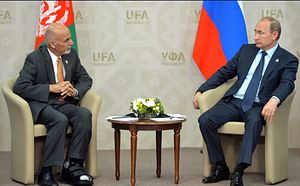The situation in Syria is changing rapidly due to the Trump administration’s intervention policy. Moscow termed the recent U.S. strike on Syria as a “significant blow to Russian-American relations” and hence suspended cooperation with the United States in Syria. Being a U.S. ally and strongly dependent upon on Washington’s aid, Kabul is becoming worried. As tensions rise in U.S.-Russia relations, the possibility of their cooperation in Afghanistan decreases. There is also a chance that Moscow will instead increase ties with the Taliban. If that happens, it will be an alarming sign for National Unity Government in Afghanistan, and probably be a game-changer in the Afghan political landscape.
However, the recent U.S. air strikes were not the first time that the six-year old Syrian conflict has impacted Afghanistan. In the post-Arab Spring period, Afghan Islamists, especially young ones, have pledged support for Syrian Islamists and condemned Syrian President Bashar al-Assad for his policies. These Afghan Islamists have not only used the social media but condemned Assad in street protests as well.
Running contrary to these protests, the former Afghan president, Hamid Karzai, tried to use the Syria card to show his displeasure with Washington and then-American President Barack Obama over many different issues such as corruption, night raids, American prisons in Afghanistan, and civilian casualties. Karzai actually congratulated Assad on a clean sweep in the presidential elections in 2013.
Aside from these indirect links with the Syrian conflict, Afghans become directly engaged in the Syrian civil war when Afghan Shia groups went to Syria to fight alongside Assad through Iran’s mediation and facilitation. The presence of Afghan Shia groups in Syria is a fact and has been regularly reported by most international media outlets. However, Afghan Shia are not alone in Syria; there are also reports of Afghan Sunnis fighting against Assad. Although, the exact number of Afghans fighting in Syria is not known, Al Jazeera estimates there are about 20,000 Afghan Shia in Syria. It is also had been reported in the media that an Afghan Shia militia of between 10-14,000 has been formed under the “Liwa Fatemiyoun” (meaning Fatemid Division).
The presence of Afghan Shia fighting in Syria could notably damage people-to-people relations between Afghanistan and the Arab states, and hence decrease Afghan soft power. Moreover, the return of these fighters to Afghanistan will definitely impact the country’s security situation as well as inter-ethnic and Sunni-Shia relations. This will be a worrying trend for the Afghan government to deal with in the future.
In addition, the connection between Islamic State (ISIS) and other militant Islamist groups with affiliates in Afghanistan will also impact the Afghan government’s fight against terrorism. There is also a possibility that in case of emergency more ISIS fighters will come to Afghanistan, where Islamic State Khorasan Province (ISKP) branch and the Taliban have seized many regions.
Meanwhile, Russia-U.S. relations have been on a downward slide since Russia invaded Georgia in 2008, resulting in tussles between Moscow and Washington in the Middle East, eastern Europe, and Afghanistan. In 2016, Russian President Vladimir Putin’s special representative to Afghanistan, Zamir Kabulov, pulled back cooperation with the United States in Afghanistan. One year later, Kabulov changed his mind and instead offered to restore cooperation with the United States on Afghanistan. However, he has been quoted by various news agencies as being against the U.S. policy and presence in Afghanistan. This confusion and uncertainty in Russian policy is not limited to cooperation or non-cooperation with the United States and NATO in Afghanistan but can also be seen in Russia’s engagement with the Afghan government and the Taliban. This confusion is reflected in Kabulov’s statements about Moscow’s ties with the Taliban and their concerns regarding the U.S. military presence in Afghanistan, contrasted with the positive statements made toward the Afghan government whenever an Afghan official visits Moscow.
The Russians started a new mechanism on Afghanistan last year and it is expected that its third meeting will take place in mid-April. Although Moscow has invited the United States to this meeting, Washington declined the invitation and instead blamed Russia for helping the Taliban.
On a larger scale, the international political order is undergoing a transformation, with regional countries such as Russia is challenging U.S. hegemony. Russia and other challengers are worried about the U.S. military presence in Afghanistan. Being located at the crossroads of Central Asia, the Middle East, South Asia, and East Asia and being a place where major powers, swing states, and regional powers alike have stakes, Afghanistan looks fated to once again become the geopolitical battleground for clashing interests.
The Afghan government is very much concerned about the rising differences between Russia and the United States because of the direct impacts on Afghanistan’s political landscape. The recent developments in the Syrian civil war have a number of implications for Afghanistan: it could decrease cooperation between the U.S.-Russia in Afghanistan and encourage Moscow to foster deeper ties with the Taliban (and even support the militant group), while the repatriation of Afghan fighters from Syria will further increase the Afghan government’s concerns. The Taliban, on the other hand, may see all of this as of benefit, and hope to take advantage of the new Cold War between the United States and Russia. If the Taliban succeeds in its diplomacy and gets Russian and Iranian support it would be a game changer in Afghan politics.
Ahmad Bilal Khalil is a researcher at the Center for Strategic and Regional Studies, Kabul (csrskabul). He follows Afghan foreign policy, Islamists, regional geopolitical and geo-economic matters, and Kabul’s relations with its neighbors (especially China, Pakistan, and India). He is working on a book on Sino-Afghan relations 1955-2015 in Pashto and tweets at @abilalkhalil

































